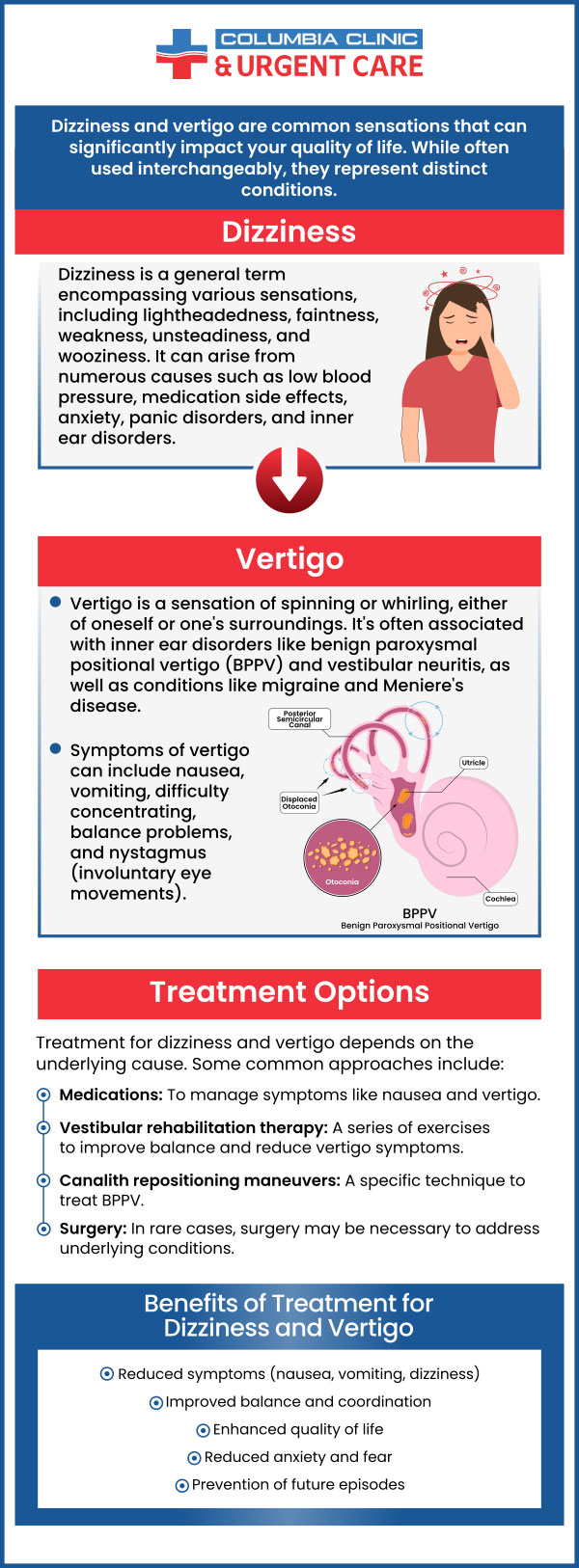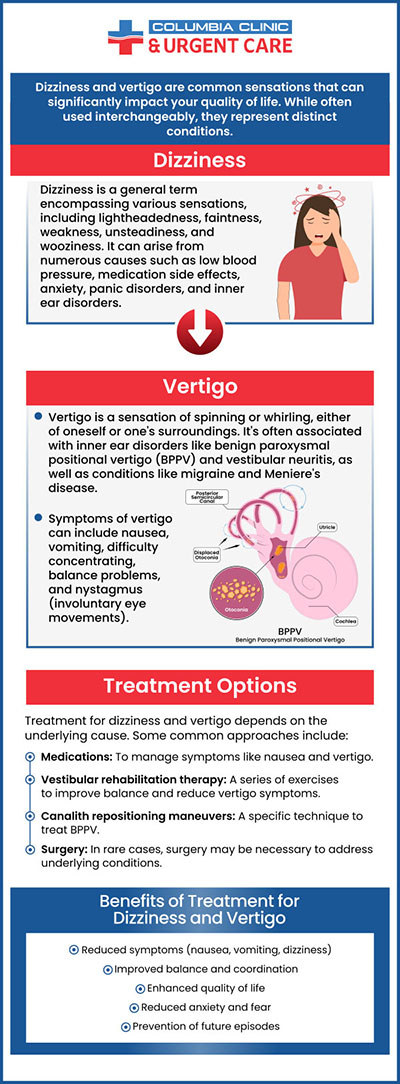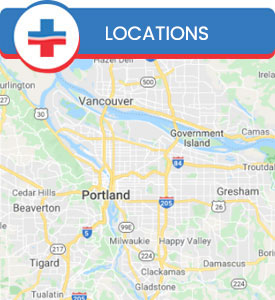Vertigo Treatment Doctor Q&A
Vertigo can be quite unpleasant and can be the reason for many underlying medical conditions that should be checked out by a medical professional. If you start to notice more frequent episodes of vertigo, it is best to contact Columbia Clinic Urgent Care. For more information, please contact us or request an appointment online. We have convenient locations to serve you at Tibbetts St Portland, Stark Street Portland and Tigard, OR. We also accept walk-ins.




Table of Contents:
What can cause vertigo?
What are the first signs of vertigo?
How do you get vertigo to go away?
When should you worry about vertigo?
Vertigo can be described as a sensation in which the environment around you begins to spin, and will make you feel quite dizzy and feel off-balance. While vertigo is not a disease, it is a symptom of a which range of varying conditions.
There are two different types of vertigo a patient can go through:
Peripheral vertigo
Peripheral vertigo occurs when there is an issue with the inner ear.
Central vertigo
Central vertigo occurs when there is an issue with the brain. A few causes of central vertigo include brain tumors, traumatic brain injury, stroke, or infection.
There are a few different syndromes and conditions that can result in vertigo to occur, including:
Benign paroxysmal positional vertigo (BPPV)
Benign paroxysmal positional vertigo is one of the most common causes of vertigo to occur. It is often triggered by a change within the head’s positioning. Patients who suffer from BPPV will often experience it when laying down, turning over in bed, or sitting up.
Meniere’s disease
Meniere’s disease is a condition that causes fluids to build up inside of the ear, this is essentially what leads to vertigo attacks.
Labyrinthitis
The inner ear has what is called a labyrinth, if it becomes inflamed or infected, it leads to what is known as labyrinthitis.
Vestibular neuritis
Vestibular neuritis occurs when there is an inflammation of the vestibular nerve which can cause vertigo to occur.
Cholesteatoma
Cholesteatoma occurs when the patient deals with repeated ear infections, which causes noncancerous growths to develop within the middle ear.
Other factors that can also cause vertigo to occur include:
– Migraine headaches
– Certain medications
– Stroke
– Arrhythmia
– Diabetes
– Head injuries
– Prolonged bed rest
– Shingles (either within the ear or near the ear)
– Ear surgery
– Perilymphatic fistula
– Hyperventilation
– Low blood pressure
– Muscle weakness
– Syphilis
– Otosclerosis
– Brain disease
– Multiple sclerosis
– Acoustic neuroma
The most common first signs that peripheral vertigo will occur include:
– Dizziness
– Issues with focusing the eyes
– Hearing loss occurs in one ear
– Balance issues
– Ringing in the ears
– Sweating
– Nausea
– Vomiting
The most common first signs that central vertigo will occur include:
– Double vision
– Issues swallowing
– Facial paralysis
– Eye movement problems
– Slurred speech
– Weak limbs
If you are beginning to notice a vertigo attack occurring, or you are dealing with vertigo, the best thing you can do is lay down in a dark, quiet room, close your eyes, and focus on taking deep breaths. This will not only help with any nausea symptoms but also help the spinning sensation. It is important to avoid stressful situations that cause anxiety and anger, as these can make your vertigo symptoms much worse.
There are other exercises and procedures that you can do to help vertigo to cease; however, these are best performed by the advice of a medical professional, as they need to ensure you focus the directions correctly in order not to make vertigo worse, or to ensure you do not hurt yourself.
It is always in one’s best interest to seek our medical attention if they begin to experience vertigo severely, for long periods of time, or if vertigo is recurring. While rare, vertigo may also be in connection with a serious medical condition. You should call 9-1-1 or go directly to your nearest emergency room if you start to notice the following:
Sense of imbalance with:
– Shortness of breath
– Chest pains
– Facial numbness
– Sudden changes in speech
– Sudden changes in vision
– Sudden changes in hearing
– Walking issues
– Falling
– Fever
– Stiff neck
– Head injury
– Seizures
– Loss of consciousness
For more information, please visit us. We look forward to serving you. We serve patients from Tibbetts St Portland, Milwaukie OR, Oak Grove OR, Stark Street Portland, Fairview OR, Happy Valley OR, Gladstone OR, Cedar Mill OR, Tibbetts Street Portland OR, West Linn OR, Aloha OR, Tigard OR, Lake Oswego OR, Tualatin OR, Oregon City OR.


